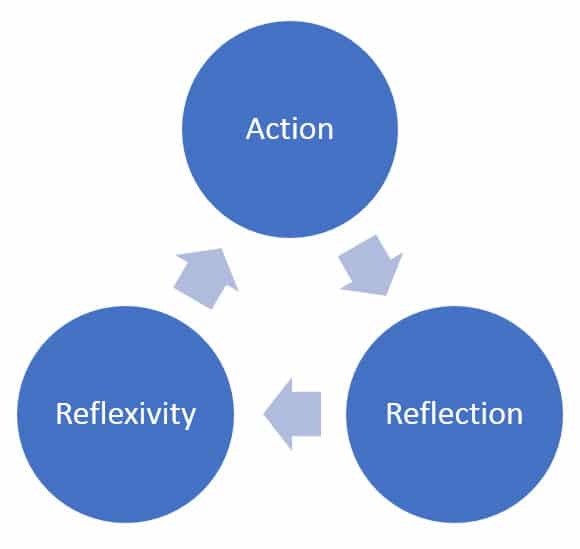What is Reflexivity in Counselling
Reflexivity in counselling practice incorporates the therapist’s experience, thoughtfully using the therapist’s relationship with themselves and their experiences to inform their responses in the therapeutic relationship.
Reflexive practice in counselling and psychotherapy is a proactive and dynamic process whereby the counsellor uses their thoughts, feelings and reflections on the therapeutic work as a basis for action.
Put simply, when a therapist’s contribution to the work is influenced in a thoughtful and responsive way by what is happening in the relationship, they are practicing reflexively.

The Difference between Reflective and Reflexive Practice
When a therapist practices reflectively, they put time and energy into thinking about and reflecting upon the therapeutic relationship, the issues the client has brought, or a number of other factors which might affect the work with a client.
Reflexive practice is a transformative process which harnesses the ideas emerging from reflection, converting thoughts into action.
Reflexive practice is often understood to incorporate the therapist’s experience, thoughtfully using the therapist’s relationship with themselves and their experiences to inform their responses (Etherington, 2016).
Reflexivity in Counselling and Self-awareness
David Rennie (2004) defines reflexivity as “Self-awareness and agency within that self-awareness”.
This means that when the therapist’s actions are rooted in reflexive practice, the therapist will have an understanding of their own internal experiencing, which allows them to access and reflect upon their responses, as well as the self-knowledge and ability to put their perceptions into action in a way which will benefit the client.
Reflexivity in counselling is when the therapist incorporate their own self awareness in their practice. The therapist thoughtfully use their relationship with self and their own experiences to inform their responses in the therapeutic relationship.
Self-awareness is crucial for reflective and reflexive practice; if the therapist cannot make sense of their own responses to any aspect of the therapeutic process with a client, they will not be able to ascertain how their experiences might be useful.
Self-awareness is an ongoing process for any practitioner – personal therapy and other personal-development resources are important, and supervision is a key space for reflection, where the therapist can be supported through the exploration of their reflections on the work, finding the best way forward reflexively in the counselling room.
Reflexivity in Counselling Practice
Reflexive practice in counselling involves an ongoing process of action → reflection → reflexivity which can often generate movement and forward-momentum in the work.
Working reflexively fosters a continuing prizing of the client’s interests and promotes therapeutic purpose at the forefront of decision-making.
It is usually considered good practice to undertake a reflective and reflexive approach to counselling.

This article was written for Counselling Tutor by Erin Stevens.
Free Handout Download
5 Ways to Be a Reflexive Practitioner
References
Etherington, K. (2016). Personal experience and critical reflexivity in counselling and psychotherapy research. Counselling and Psychotherapy Research. BACP, Taylor Francis (Routledge).
Rennie, D. L. (2004) Reflexivity and Person-Centred Counselling. Journal of Humanistic Psychology, Vol. 44 No. 2, pp.182-203.